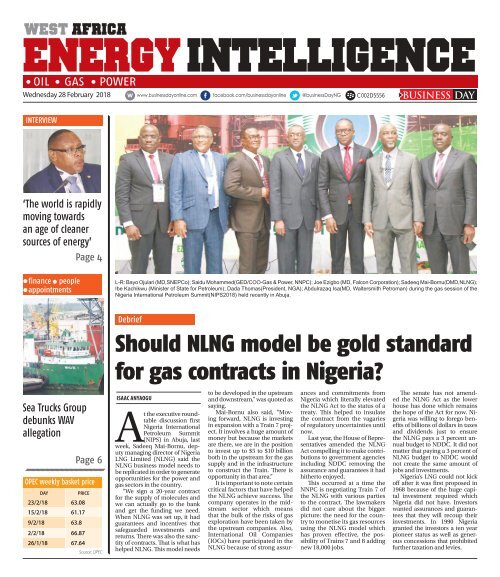BusinessDay 28 Feb 2018
Create successful ePaper yourself
Turn your PDF publications into a flip-book with our unique Google optimized e-Paper software.
WEST AFRICA<br />
ENERGY intelligence<br />
oil gas power<br />
Wednesday <strong>28</strong> <strong>Feb</strong>ruary <strong>2018</strong><br />
C002D5556<br />
BUSINESS DAY<br />
interview<br />
‘The world is rapidly<br />
moving towards<br />
an age of cleaner<br />
sources of energy’<br />
Page 4<br />
finance people<br />
appointments<br />
L-R: Bayo Ojulari (MD,SNEPCo); Saidu Mohammed(GED/COO-Gas & Power, NNPC); Joe Ezigbo (MD, Falcon Corporation); Sadeeq Mai-Bornu(DMD,NLNG);<br />
Ibe Kachikwu (Minister of State for Petroleum); Dada Thomas(President, NGA); Abdulrazaq Isa(MD, Waltersmith Petroman) during the gas session of the<br />
Nigeria International Petroleum Summit(NIPS<strong>2018</strong>) held recently in Abuja.<br />
Sea Trucks Group<br />
debunks WAV<br />
allegation<br />
Page 6<br />
OPEC weekly basket price<br />
DAY<br />
PRICE<br />
23/2/18 63.08<br />
15/2/18 61.17<br />
9/2/18 63.8<br />
2/2/18 66.87<br />
26/1/18 67.64<br />
Source: OPEC<br />
Debrief<br />
Should NLNG model be gold standard<br />
for gas contracts in Nigeria?<br />
ISAAC ANYAOGU<br />
At the executive roundtable<br />
discussion first<br />
Nigeria International<br />
Petroleum Summit<br />
(NIPS) in Abuja, last<br />
week, Sadeeq Mai-Bornu, deputy<br />
managing director of Nigeria<br />
LNG Limited (NLNG) said the<br />
NLNG business model needs to<br />
be replicated in order to generate<br />
opportunities for the power and<br />
gas sectors in the country.<br />
“We sign a 20-year contract<br />
for the supply of molecules and<br />
we can actually go to the bank<br />
and get the funding we need.<br />
When NLNG was set up, it had<br />
guarantees and incentives that<br />
safeguarded investments and<br />
returns. There was also the sanctity<br />
of contracts. That is what has<br />
helped NLNG. This model needs<br />
to be developed in the upstream<br />
and downstream,” was quoted as<br />
saying.<br />
Mai-Bornu also said, “Moving<br />
forward, NLNG is investing<br />
in expansion with a Train 7 project.<br />
It involves a huge amount of<br />
money but because the markets<br />
are there, we are in the position<br />
to invest up to $5 to $10 billion<br />
both in the upstream for the gas<br />
supply and in the infrastructure<br />
to construct the Train. There is<br />
opportunity in that area.”<br />
It is important to note certain<br />
critical factors that have helped<br />
the NLNG achieve success. The<br />
company operates in the midstream<br />
sector which means<br />
that the bulk of the risks of gas<br />
exploration have been taken by<br />
the upstream companies. Also,<br />
International Oil Companies<br />
(IOCs) have participated in the<br />
NLNG because of strong assur-<br />
ances and commitments from<br />
Nigeria which literally elevated<br />
the NLNG Act to the status of a<br />
treaty. This helped to insulate<br />
the contract from the vagaries<br />
of regulatory uncertainties until<br />
now.<br />
Last year, the House of Representatives<br />
amended the NLNG<br />
Act compelling it to make contributions<br />
to government agencies<br />
including NDDC removing the<br />
assurance and guarantees it had<br />
hitherto enjoyed.<br />
This occurred at a time the<br />
NNPC is negotiating Train 7 of<br />
the NLNG with various parties<br />
to the contract. The lawmakers<br />
did not care about the bigger<br />
picture: the need for the country<br />
to monetise its gas resources<br />
using the NLNG model which<br />
has proven effective, the possibility<br />
of Trains 7 and 8 adding<br />
new 18,000 jobs.<br />
The senate has not amended<br />
the NLNG Act as the lower<br />
house has done which remains<br />
the hope of the Act for now. Nigeria<br />
was willing to forego benefits<br />
of billions of dollars in taxes<br />
and dividends just to ensure<br />
the NLNG pays a 3 percent annual<br />
budget to NDDC. It did not<br />
matter that paying a 3 percent of<br />
NLNG budget to NDDC would<br />
not create the same amount of<br />
jobs and investments.<br />
Nigeria’s LNG could not kick<br />
off after it was first proposed in<br />
1968 because of the huge capital<br />
investment required which<br />
Nigeria did not have. Investors<br />
wanted assurances and guarantees<br />
that they will recoup their<br />
investments. In 1990 Nigeria<br />
granted the investors a ten year<br />
pioneer status as well as generous<br />
concessions that prohibited<br />
further taxation and levies.


















